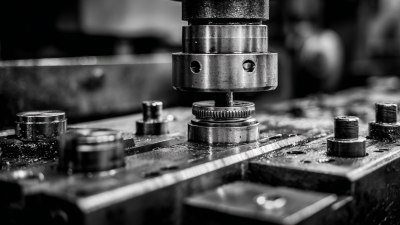Exploring Innovative Examples of Industrial Supplies and Equipment for Modern Manufacturing
In today’s rapidly evolving manufacturing landscape, the significance of innovative industrial supplies and equipment cannot be overstated. According to a report by the International Federation of Robotics, global industrial robot sales have surged by 12% year-on-year, reflecting a broader trend towards automation and efficiency in manufacturing processes. As industries strive to enhance productivity and reduce operational costs, the demand for cutting-edge solutions in industrial supplies and equipment is reaching unprecedented levels.

This blog aims to explore a variety of groundbreaking examples that showcase how modern manufacturing is being transformed through innovative tools and technologies, addressing the diverse needs of manufacturers seeking to remain competitive in an increasingly complex global market. By examining these solutions, we will uncover the potential for growth and improvement within the sector, highlighting the critical role that industrial supplies and equipment play in shaping the future of manufacturing.
Revolutionizing Manufacturing: The Role of Smart Industrial Tools
The advent of Industry 4.0 is reshaping the manufacturing landscape, with smart industrial tools playing a crucial role in this transformation. A report from McKinsey indicates that embracing digital technologies can lead to productivity gains of up to 30% in manufacturing operations. One of the most significant advancements is the integration of Internet of Things (IoT) sensor technology, which facilitates real-time data collection and connectivity among machines. By 2025, it is expected that IoT sensors will enable 30% more efficient operating procedures, driving significant improvements in operational performance across various sectors.
Additionally, collaborative robots, or cobots, are redefining automation by working alongside human operators to enhance precision and adaptability in manufacturing processes. Research by the International Federation of Robotics predicts that the deployment of cobots could lead to a 25% increase in production flexibility, empowering manufacturers to respond more swiftly to market demands. Furthermore, the implementation of AI-driven systems offers unprecedented autonomy in decision-making, allowing for smarter supply chain management and cost reductions. With these innovative technologies, the future of manufacturing is not only about increased efficiency but also about creating sustainable practices that will support long-term growth and success.
Exploring Innovative Examples of Industrial Supplies and Equipment for Modern Manufacturing
| Tool/Equipment | Type | Applications | Smart Features |
|---|---|---|---|
| 3D Printer | Additive Manufacturing | Prototyping, Custom Parts | Remote Monitoring, Automated Calibration |
| CNC Machine | Subtractive Manufacturing | Precision Part Production | IoT Connectivity, Predictive Maintenance |
| Robotic Arm | Automation | Assembly, Packaging | AI Integration, Real-Time Feedback |
| Industrial IoT Sensors | Monitoring | Equipment Health Tracking | Data Analytics, Cloud Integration |
| Smart Wearables | Safety | Worker Health and Safety | Real-Time Health Monitoring, Alerts |
Sustainable Solutions: Eco-Friendly Equipment in Modern Manufacturing
 In the realm of modern manufacturing, the focus on sustainability has never been more critical. Companies are increasingly adopting eco-friendly equipment to minimize their environmental impact while maximizing efficiency. One innovative solution is the use of energy-efficient machinery. These machines are designed to consume less power, reducing greenhouse gas emissions and lowering energy costs. Additionally, advancements in automation technology enable manufacturers to optimize production processes, ensuring that resources are used judiciously.
In the realm of modern manufacturing, the focus on sustainability has never been more critical. Companies are increasingly adopting eco-friendly equipment to minimize their environmental impact while maximizing efficiency. One innovative solution is the use of energy-efficient machinery. These machines are designed to consume less power, reducing greenhouse gas emissions and lowering energy costs. Additionally, advancements in automation technology enable manufacturers to optimize production processes, ensuring that resources are used judiciously.
Another significant trend is the rise of biodegradable materials and recyclable supplies in industrial applications. Manufacturers are now utilizing materials that not only reduce waste but also enhance the lifecycle of products. For instance, packaging solutions made from plant-based materials are gaining popularity, as they decompose much faster than traditional plastics. Moreover, the incorporation of water-based paints and coatings helps in reducing harmful VOC emissions, further contributing to a cleaner manufacturing environment. By investing in these sustainable solutions, manufacturers are not only adhering to regulatory standards but are also appealing to a growing segment of eco-conscious consumers.
Automation in Action: How Robotics Transform Industrial Supply Chains
The integration of robotics in industrial supply chains marks a pivotal shift in modern manufacturing, significantly enhancing efficiency and productivity. As manufacturers strive for quicker turnaround times and reduced costs, the deployment of automated systems becomes essential. Robotics streamline operations by handling repetitive tasks such as inventory management, sorting, and packaging, which minimizes human error and accelerates processes. The use of autonomous mobile robots (AMRs) in warehouses, for instance, allows for seamless navigation through complex environments, ensuring materials are delivered to the assembly lines swiftly.
Furthermore, robotics technology fosters a more adaptable manufacturing ecosystem. With the application of artificial intelligence, robots can learn from their environment and improve their performance over time. This adaptability is crucial in today's fast-paced market, where customer demands can change rapidly. Companies can deploy collaborative robots, or cobots, that work alongside human operators, enhancing capabilities without compromising safety. As automation continues to evolve, the transformation of industrial supply chains not only boosts output but also positions manufacturers to be more competitive in an increasingly globalized landscape.
Advanced Materials: Pioneering Innovations for Enhanced Productivity
In the realm of modern manufacturing, advanced materials stand at the forefront of innovation, driving productivity and efficiency to new heights. From carbon fiber composites to smart alloys, manufacturers are leveraging these pioneering materials to create products that are not only lighter and stronger but also more durable and cost-effective. These advancements enable companies to streamline their production processes, reduce waste, and ultimately enhance their competitive edge in a fast-paced market.
Tip: When considering the integration of advanced materials into your manufacturing processes, it’s crucial to conduct thorough research. Evaluate the specific requirements of your projects and focus on materials that align with your production goals. This approach will ensure that you harness the true potential of cutting-edge innovations.
Another exciting development is the use of nanotechnology in manufacturing. By manipulating materials at the molecular level, manufacturers can create coatings that resist wear and improve resistance to corrosion, leading to longer-lasting products. This level of innovation not only boosts product longevity but also minimizes environmental impact, aligning with sustainability goals that are increasingly important in today’s industry.
Tip: Stay updated on the latest research and developments in nanotechnology by engaging with industry publications and attending seminars. Networking with experts can provide insights that help you implement these technologies effectively in your operations.
Data-Driven Decisions: Leveraging IoT in Industrial Equipment Selection
In the realm of modern manufacturing, leveraging Internet of Things (IoT) technologies plays a pivotal role in equipment selection and operational efficiency. By harnessing data-driven insights, manufacturers can make informed decisions about the industrial supplies and equipment they choose to adopt. IoT enables real-time monitoring of equipment performance, allowing organizations to analyze vast amounts of data to optimize workflows, reduce downtime, and increase productivity. As a result, smart manufacturing systems become more adaptive, capable of responding to changes in demand with greater agility.

Integrating artificial intelligence alongside IoT further enhances the decision-making process. AI algorithms analyze data collected from connected devices, yielding insights that empower manufacturers to refine their production processes and supply chain management. For instance, AI-driven demand-side management can optimize energy consumption based on real-time usage patterns, drastically reducing operational costs. Moreover, the combination of big data analytics and smart technology helps identify potential issues before they arise, enabling proactive maintenance strategies and improving overall sustainability within industrial operations. As the manufacturing landscape continues to evolve, the capabilities afforded by IoT and AI will be integral to staying competitive and efficient.
Related Posts
-

Addressing Common Issues with Basic Machine Shop Equipment: Solutions for Global Buyers
-

Top Strategies for Maximizing Efficiency with Machine Shop Tools and Equipment in Modern Manufacturing
-

Ultimate Guide to Selecting the Right Oil Field Machine for Your Operations
-

Uncovering the Advantages of Industrial Machine Equipment in Enhancing Global Supply Chain Efficiency
-

The Ultimate Guide to Choosing the Right Industrial Machinery and Equipment for Your Business
-

Mastering Industrial Shop Equipment A Comprehensive Guide for Beginners
